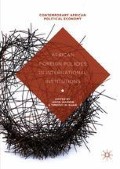Abstract
Foreign policymaking can, and often has, become subject to the vicissitudes of autocratic political leaders, or what I refer to as the ‘cult of personality’. This chapter assesses how the cult of personality has been exploited in the Southern African region by leaders to instrumentalise and manipulate the Southern African Development Community (SADC) to serve their interests. This chapter explores the key thematic drivers that influence and orient the behaviour of states within regional institutions in the Southern African region. It examines the South African-led SADC intervention in Lesotho, and concludes with some recommendations on strategies for mitigating against the instrumentalisation of foreign policy.
References
Barber James, and John Barratt. 1990. South Africa’s Foreign Policy: The Search for Status and Security. Cambridge: Cambridge University Press.
Graham, Matthew. 2015. The Crisis of South African Foreign Policy: Diplomacy, Leadership and the Role of the African National Congress. London: I.B. Tauris.
Gevisser, Mark, and Thabo Mbeki. 2007. The Dream Deferred. Jonathan Ball: Johannesburg.
Hollander, Paul. 2002. The Cult of Personality in Communist States. In Discontents: Postmodern and Post-communist. New Brunswick, NJ: Transaction.
Kabureka, Donald. 2016. Securing Predictable and Sustainable Funding for Peace in Africa. Addis Ababa: African Union Peace Fund.
Kagame, Paul. 2017. The Imperative to Strengthen our Union. Report on the Proposed Recommendations for the Reform of the African Union, 29 January 2017. Addis Ababa: Ethiopia.
Le Monde Diplomatique. 2012. La France, Acteur cle de la crise Malagache, March 2012.
Mandela, Nelson. 1993. South Africa’s Foreign Policy. Foreign Affairs, 72.
Mark, Malan. 1998. Regional Power Politics under covers of SADC: Running Amok with a Mythical Organ, Occasional Paper 35. Institute for Security Studies, October.
Minter, William. 1994. Apartheid’s Contras: An Inquiry into the Roots of War in Angola and Mozambique, 128–139. Johannesburg: Witwatersrand University Press and Zed Books; and Fred Bridgland, Jonas Savimbi: A Key to Africa, Edinburgh: Coronet Books, 1986.
Solomon, Hussein, ed. 1997. Fairy Godmother, Hegemon or Partner? In Search of a South African Foreign Policy. Pretoria: Institute for Security Studies.
Southall, Roger. 2001. SADC’s Intervention into Lesotho: An Illegal Defence of Democracy? In African Interventionist States, ed. Oliver Furley and Roy May, 157. Aldershot: Ashgate.
Wright, Stephen, ed. 1999. African Foreign Policies. Boulder: Westview Press.
Author information
Authors and Affiliations
Editor information
Editors and Affiliations
Copyright information
© 2018 The Author(s)
About this chapter
Cite this chapter
Murithi, T. (2018). The Instrumentalisation of SADC to Achieve Foreign Policy Agendas. In: Warner, J., Shaw, T. (eds) African Foreign Policies in International Institutions. Contemporary African Political Economy. Palgrave Macmillan, New York. https://doi.org/10.1057/978-1-137-57574-6_10
Download citation
DOI: https://doi.org/10.1057/978-1-137-57574-6_10
Published:
Publisher Name: Palgrave Macmillan, New York
Print ISBN: 978-1-137-57573-9
Online ISBN: 978-1-137-57574-6
eBook Packages: Political Science and International StudiesPolitical Science and International Studies (R0)

